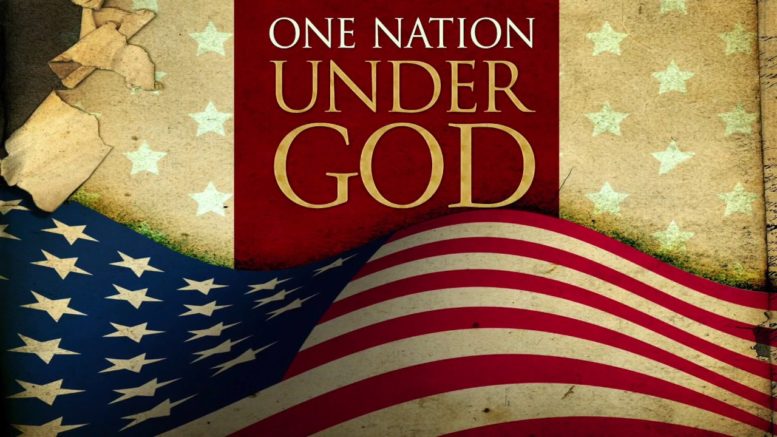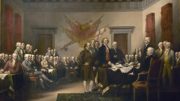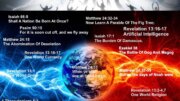Today we’ll look at the first Bible printed in America—the Aitken Bible. In many ways, this Bible is no different from any other. What is relevant is its place in America’s founding; what this Bible represents. Those ideas are relevant today. We’ll begin with looking at the Aiken Bible itself. The next article covers its relevance.
The Bible and Colonial America
In 1775, there were about 50 presses in the Colonies. These were in the hands of individuals who did various projects. But no English Bible was printed here. Several reasons existed for that being the case. First, the type and paper needed for its printing weren’t readily available. Second, these printers used their presses for smaller, less expensive, projects. These included newspapers, pamphlets, tracts, etc. Finally, the printing of English Bibles outside of England was illegal.
This last item enabled the Crown to control both the Bible’s printing revenues and contents. There were some exceptions though. There were no restrictions on Bible translations, and two were printed in the Colonies. The first in 1663 (Algonquin). The other three were German printings in 1743, 1763, and 1776. There were also no restrictions on printing portions of the Bible. Robert Aitken printed America’s first New Testament Bible in 1777. Other printers released similar Bibles in 1779, 1780, and 1781.
Wartime Impacts
The Continental Congress first met in September, 1774. They adopted articles in October declaring an embargo on British goods beginning 9/11/1775; unless Britain repealed the series of laws adopted earlier that year (known as the Intolerable Acts) by December.
The battle at Lexington began the War for Independence on 4/19/1775. After several years of embargo, some supplies were running short. One of those was the English Bible. In July, 1777 three clergymen petitioned Congress about the problem as follows;
“[I]n our present circumstances, books in general, and in particular, the holy Scriptures contained in the old and new Testaments are growing so scarce and dear, that we greatly fear that unless timely care be used to prevent it, we shall not have bibles for our schools and families, and for the publick worship of God in our churches.
‘We therefore think it our duty to our country and to the churches of Christ to lay this danger before this honourable house, humbly requesting that under your care, and by your encouragement, a copy of the holy Bible may be printed.”[1]
Congress considered the petition again on 9/11/77. Due to problems with obtaining paper and type, it recommended importing 20,000 Bibles into the Colonies. We know nothing further about this resolution. Meanwhile, Robert Aitken advertised his New Testament in August, 1777. It was so successful; he published a new edition each of the next five years.
First Bible Printing
Toward the war’s end, Aitken presented a memorial to Congress on 1/21/81 for the printing of an English Bible in America. It read in part;
“[Y]our Memorialist begs leave to inform your Honours That he both begun and made considerable progress in a neat Edition of the Holy Scriptures for the use of schools, But being cautious of suffering his copy of the Bible to Issue forth without the sanction of Congress, Humbly prays that your Honours would take this important matter into serious consideration & would be pleased to appoint one Member or Members of your Honourable Body to inspect his work so that the same may be published under the Authority of Congress.”[2]
The appointed committee considered the project on 9/1/1782. It learned at the same time the Aitken Bible was almost ready for publication. The committee appointed the two Chaplains of Congress to review the work.
Congressional Approval
The Chaplains reported back to Congress on 9/10/1782.
“[W]e are of the opinion that it is executed with great accuracy as to the sense, and with a few grammatical and typographical errors as could be expected in an undertaking of such magnitude. Being ourselves witnesses of the demand for this invaluable book, we rejoice in the present prospect of a supply.”[3]
On 9/12/1782, Congress declared;
“THAT the United States in Congress assembled highly approve the pious and laudable undertaking of Mr. Aitken, as subservient to the interest of religion, … they recommend this edition of the Bible to the inhabitants of the United States, and hereby authorize him to publish this Recommendation in the manner he shall think proper.”[4]
Aitken omitted the Apocrypha; consistent with other small King James versions at this time.
Early America
But it doesn’t end here. A few years later Congress enacted the Northwest Ordinance on 7/13/1787. Article 3 of this legislation reads in part, “Religion, morality and knowledge, being necessary to good government and the happiness of mankind, schools and the means of education shall forever be encouraged.”[5] The morality and knowledge coming from the Bible was a critical part of education, supplemented by classical works in various areas. This formed the basis of both Protestant and Catholic curricula at that time.
We see similar ideas about morality and virtue expressed by George Washington in his Circular to the States (1783), First Inaugural Address (1789), and Farewell Address (1796). These are not the only places where he made such references. Neither is Washington the only Founding Father who made such statements. Far from it.[6] We can cap this discussion off with our Declaration of Independence (1776). The Declaration didn’t create the ideas mentioned above, instead it summarized what already existed and presented it to Britain and the world. As individuals and a nation we choose to put God first, and the Bible is His word.
This isn’t about religion, but principles and ideas. Our Founders chose Biblical principles as man’s best hope for good society and government. However imperfect, history shows they were right. Each generation choses the ideas and principles it holds. But we must teach and support them so they remain. We’ll take up that subject next time.
Footnotes:
[1] The Aitken Bible Historical Foundation, pp. v-vi, The Aitken Bible, Ebon Papyrus, 2020.
[2] Ibid, p. x.
[3] Ibid, p. 2.
[4] Ibid, p. 3.
[5] Northwest Ordinance, Yale Law School, Avalon Project, http://avalon.law.yale.edu/18th_century/nworder.asp. Accessed Jan., 2016
[6] Wolf, Dan, pp. 36-43, The Light & the Rod: Biblical Governance Corruptions, Living Rightly Publications, 2020. These pages contain just a few examples. https://www.amazon.com/Dan-Wolf/e/B01LW7RK7L?ref=sr_ntt_srch_lnk_1&qid=1641413803&sr=1-1





